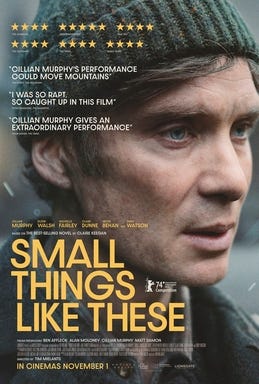I've just watched Small Things Like These, starring Cillian Murphy.
It’s set in the 1980s and exposes yet more crimes of the nuns in the Magdalene Laundries in Ireland. Crimes which, as far as I’m aware, no nun has served a prison sentence for.
It’s valuable because it shows that Matriarchies can be just as evil as Patriarchies. Even if the nuns are a product of a patriarchal religion, they are certainly autonomous and powerful in the film. Whilst in other contexts, nuns have been – and still are – used as prostitutes by priests on a global scale, here they are most certainly evil Matriarchs.
The film itself is art-house and derived from a work of literature and was hard work in places because everything was set in a gloomy, murky, noire Wexford where you have to peer deep into the shadows to actually see what’s going on. It’s an over-used, worn-out movie technique that was completely unnecessary and distorts the truth. The abuse crimes of the nuns are often committed in bright, Walt-Disney technicolour. Just like any other crimes. Whilst it creates mood and style to show the oppressive, sinister, opaque interiors of the convent, it’s a little simplistic for the very sophisticated nature of the story. As a boy, I walked through the corridors of a similar convent that was lit with the typical pastel, sterile, lifeless-but-bright colours associated with the institutions of the Catholic Church, and I found it equally menacing.
But the film does a brilliant job of exposing the nuns’ crimes and their matriarchal steel hand in a velvet glove. The dialogue is superb and it’s clearly authentic. We gain a real insight into how these women operate to hide the truth.
When a Catholic abuser commits a crime, their victim usually has two options, which lead to the same conclusion. Firstly, they may disassociate and forget what happeed. Secondly, in response to physical threats and being called a liar, they are intimidated and decide it’s better to forget what happened.
But there’s a third way, which also leads to amnesia and I had completely overlooked. Or rather forgotten. Which speaks volumes. An endorsement of just how effective this third way is. The nuns use it in the movie and it’s so polished, so well performed, it’s clearly a method in constant use – even today – as I can personally confirm.
The nuns Kill the Accusation With Kindness.
In our modern world of using acronyms to describe psychological techniques, I call it KAWK.
And they then add some bribery and a subtle threat, easily denied, if their target continues to challenge them.
So in the movie, a pregnant teenage girl wants to leave the convent where she has been dumped by her parents. Even in the 1980s it would seem that girls could be incarcerated against their will by the Irish theocratic state. To punish her for her rebellion, the nuns lock her in a coal shed. Night after night. In the middle of winter.
The coal man (Killian Murphy), delivering sacks of coal, discovers and frees her. Because it’s the 1980s, the nuns have to explain their abusive and criminal behaviour. So they show great kindness and compassion to the girl, making a fuss of her, getting her to sit by a roaring fire, offering her tea and cake. And the coal man, too.
KAWK.
The Mother Superior asks her gently, in front of the coal man, what was she doing in the coal shed? The terrified girl, aware of the further punishments the nuns will inflict upon her if she reveals the truth about these hell hags, says that it was the other girls who locked her in the coal shed.
The Mother Superior kindly and softly admonishes the girl. Surely she is too old to be playing hide and seek? The girl remains silent. Perhaps over time she might even believe her lie.
KAWK.
Then the nun turns her attention to the coal man. Firstly with a bribe – she gives him a great wad of pound notes as a Christmas present for his wife. Then follows it up with fairly subtle threats. He has two daughters eligible for the convent school. It might be difficult to find places for them. She’ll do her best to accommodate them. But it’s a thin wall between the convent school and the Magdalen laundry for wayward girls next door…
I won’t say more in case you’re planning to watch the film.
All this tallied with my own experience as an eleven-year-old boy. After an assault by a De La Salle Brother (Brother James), everyone – including Brother James himself – behaved with considerable kindness to me and acted as if the assault never happened.
KAWK.
Then followed it up with a bribe – a brand new and top of the range bike (with twist gears, no less) and some BS promise about becoming a junior knight, which another common bribe used by Catholic abusers. One such teacher at my school, Kevin Tracey, used it and ran away with a boy for fifteen months. The boy was told he would be head of a league of junior crusaders. Today, they’d probably say he would be head of a junior league of X Men. But, in my childhood, (murderous) crusaders were the fantasy warriors we aspired to be.
And all the time the abuser and his enabler behaved as if nothing had actually happened. And so, after a while, I started thinking maybe it never actually happened. My brain was being subtly rewired. I was losing my grip on reality with a capital ‘R’. There was no external touchstone.
It’s how all cults work, of course, and the Catholic Church is no exception. It relies on the victim being young and impressionable and with no external influences that can challenge the lie. The victim must be isolated and friends and family must be supportive parts of the pernicious system. This was true in my case and in the case of the movie.
So the remarkable thing about the KAWK used in the film is that – despite a lifetime of hostility towards the crimes of the Catholic Church – I actually believed the Mother Superior’s absolute bs.
I found myself accepting her explanation for why the girl was locked in the coal shed and appreciating the nuns’ ‘kindness’ and ‘compassion’ offered to ‘the poor child’. Even the blatant bribes offered to the coal man seemed perfectly acceptable and understandable to me.
That’s how effective Catholic conditioning and KAWK is. I genuinely bought into it all, despite myself!
Probably a Catholic abuser locking me out, and spending a night in the coal shed for daring to question Catholicism (by reading a book by Swedenborg) , must have also triggered my memories. But that, of course, is from the ‘physical threats’ armoury for abusers, very popular when I was growing up and requiring far less skill and patience than KAWK.
And certainly the Catholics I knew enjoyed it more. It’s much more fun for them, beating up rebellious children than trying to reason with them.
When the film was over, I ‘woke up’ and was, of course, appalled that I – of all people – could believe these criminals, even for a short period of time during the movie.
I’m pretty certain that this was because, in my childhood, everyone behaved like the assault never happened, that I started to believe that myself. You doubt your own reality. Catholics must have used the system many times for it to be as potent and polished as it was in Small Things.
If the coal shed doesn’t bring the rebel to heel, then try the softly, softly approach.
That’s why I think it needs an acronym – KAWK: Killing an accusation with kindness.
It’s a system that works well elsewhere. DARVO, for instance. An acronym for "deny, attack, reverse victim & offender"
According to Wikipedia:
DARVO is a tactic used by a perpetrator to avoid accountability for their actions. As the acronym suggests, DARVO commonly involves these steps:
The perpetrator denies the harm or abuse ever took place.
When confronted with evidence, the perpetrator then attacks the person that they had harmed, or are still harming. The attacker may also attack the victim's family and/or friends.
Finally, the perpetrator claims that they were or are actually the victim in the situation, thus reversing the positions of victim and offender. It often involves not just playing the victim but also victim blaming.
Catholic practitioners of KAWK have slipped through the psychological net and so it needs identifying, possibly in more sophisticated and academic detail. There may be a better and more comprehensive acronym, for example. ‘Putting a Kawk in it’ may be a vulgar distraction from a serious abusive technique that needs exposing.
It matters because Catholics are still using KAWK today. Thus if a victim of Catholic abuse contacts Catholic Safeguarding, they are given the psychological equivalent of ‘tea and sympathy’ and, on occasion, free counselling, but nothing of substance is actually done. And it seems to work for some Survivors, just as it briefly worked for me while I was watching Small Things. Catholic Safeguarding (the Religious Life Safeguarding Service) once proudly sent me an impressive batch of genuine, anonymous but positive and empty affirmations by Survivors saying how wonderful and kind Safeguarding were. To me, they felt straight out of a Hallmarks card movie. All were soft and fluffy. There was no substance to them. And there is always substance to abuse. I think the RLSS believed their positive endorsements would get me on side. They didn’t. I was not impressed. But the Survivors clearly were.
The trick worked. And that’s all it is. A trick knowingly used on Survivors. Not that different, ultimately, to the nuns on Small Things.
So eventually the Survivor may move on and try to forget it all, which is what Safeguarding wants. Never justice – not least because the religious orders responsible for the crimes are their paymasters. There are no independent watchguards.
Similarly, the now defunct BFMS – British False Memory Society – must have used KAWK, too.
At one meeting I attended incognito, they read out a list of ‘Recanters’ who had retracted their accusations, doubtless using kindness rather than threats to make Survivors change their minds and their memories.
Despite watching Small Things, and its powerful KAWK, I don’t think that’s likely to happen to me any time soon.





Thanks! The successful brainwashing techniques used by nuns and monks always fascinates me and occasionally catches me off balance as in Small Things. What was the upcoming series you referred to?
Amazing post. This gives us just a small insight into where the motivation for “Nemesis” came from!
The upcoming series incidentally seems to correct for “Nemesis” not being warped or extreme enough :)